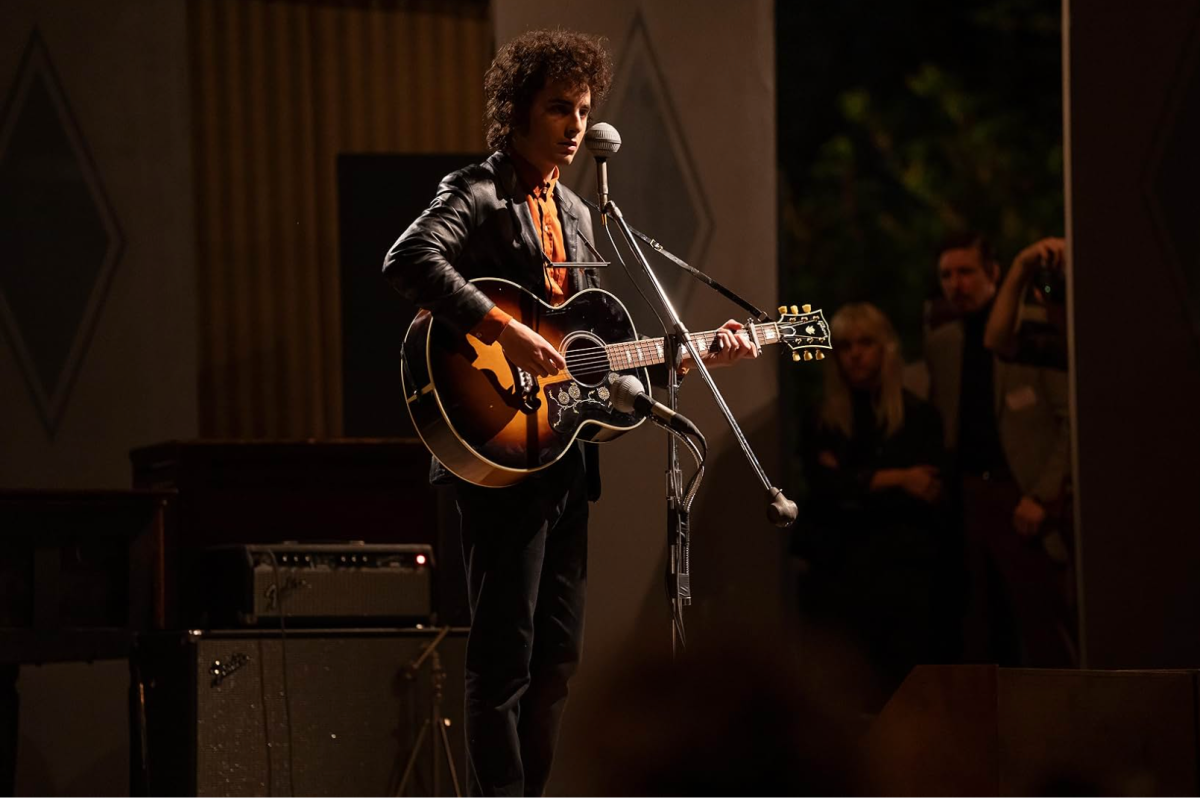
IMDB
When you hear about a new Bob Dylan biopic, your initial reaction might be something like, “Oh, Timothée Chalamet is in it — I liked him in Dune,” or perhaps even more fittingly, “Wait, Bob Dylan’s still alive?” You wouldn’t be alone in thinking that. In fact, Dylan’s most memorable moment in recent history was arguably his controversial blonde hipster look at the 2003 Sundance Film Festival — a style Chalamet perfectly recreated during the film’s press tour. You might not even be able to name a single Dylan song or know who he is outside of your parents’ — or grandparents’ — grumblings about how good he was.
“A Complete Unknown” provides a brief snapshot of Dylan’s meteoric rise to folk god status and his resulting disdain for the title. The film opens in 1961, with Dylan doing his best Jack Kerouac impression, hitching a ride into New York City in hopes of meeting his idol and famous folk musician Woody Guthrie. Guthrie is suffering from Huntington’s disease, forcing him to rely on the support of his close friend and equally talented folk musician Pete Seeger (Ed Norton). After winning their admiration, Dylan falls under Seeger’s wing, allowing him to break into the New York folk scene alongside contemporary Joan Baez (Monica Barbaro).
Dylan begins a relationship with Sylvie Russo (Elle Fanning) as his career starts to take off, with his songs becoming the voice for a generation of protest. Dylan spends the rest of the movie struggling to deal with his sudden lack of privacy as his fans have elevated him to hero status. He begins to clash with Seeger amid his ever-perplexing and torrid relationship with Baez. The movie culminates in 1965 with Dylan’s incredibly contentious performance at the Newport Folk Festival.
Chalamet doesn’t just portray Bob Dylan, he embodies Dylan in all of the worst (or best) ways. In nearly every scene, especially toward the end of the movie, Dylan is abrasive at best and a contemptible, self-righteous jerk at worst. Chalamet embraces this side of Dylan to the point that you will walk out of the theater finding yourself angry at how convincing his portrayal was. Chalamet’s Dylan is moody and hostile, smoking cigarettes and mumbling passive-aggressive comments at whoever dares to question his greatness (aka trying to get him to do the normal and sane thing).
His brief relationship with Sylvie is captivating at first, as Dylan still retains some Midwest innocence, but her character is soon reduced to jilted lover status. Her reappearance at the end of the movie feels out of place, although it does provide the audience with a hilariously unserious attempt by Dylan to get Sylvie to stay. Chalamet channels every male manipulator stereotype in the book to try and keep Baez as well as Sylvie throughout the movie (someone needed to buy him a pair of nail clippers).
Norton gives a surprisingly sincere performance of Seeger, honoring his memory as a pacifist and pioneer of peace. It is heartbreaking to watch Seeger, who took Dylan in and started him on his path to stardom, slowly drift away from Dylan as the latter becomes increasingly hostile toward the outside world and those who only want the best for him. Despite every wedge Dylan attempts to drive between himself and the folk community he has become disillusioned with, Seeger never shows anything but grace and compassion. Norton renders this heartbreak so convincingly that it’s hard not to walk out mad at how he was treated. Barbaro portrays Baez, who becomes intimate with Dylan before realizing the depths of his conceit and promptly kicking him to the curb. Barbaro captures the love and compassion for folk music that Baez was famous for. Her no-nonsense approach to Dylan’s antics endears her to the audience as the movie progresses. The most notable performance, however, comes from the “Man in Black” himself, Johnny Cash (Boyd Holbrook). Cash, in the throes of addiction, manages a correspondence with Dylan that is akin to Yoda and Luke Skywalker. His appearances may be brief but each word he utters makes you want to raise hell and, to quote the man himself, “Track mud on the carpet.”
After all of this praise, you might wonder why the review is as low as it is. Music biopics have been in vogue since 2018’s “Bohemian Rhapsody,” honoring the once-in-a-lifetime Freddie Mercury. While some of these biopics have been enjoyable, “A Complete Unknown” felt like an unnecessary story to tell. The movie itself is well-written and most of the characters are very convincing, but, in the end, it begs the question, “Did we need this?” Dylan is represented in a feeble light, hurting everyone who cares about him under the guise of just “being himself” and fighting his unwanted notoriety. While it might not have been the most important story, it’s still an enjoyable ride through the ’60s music scene.